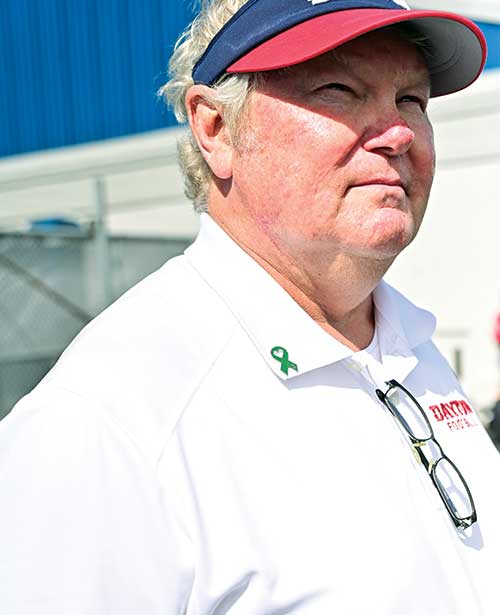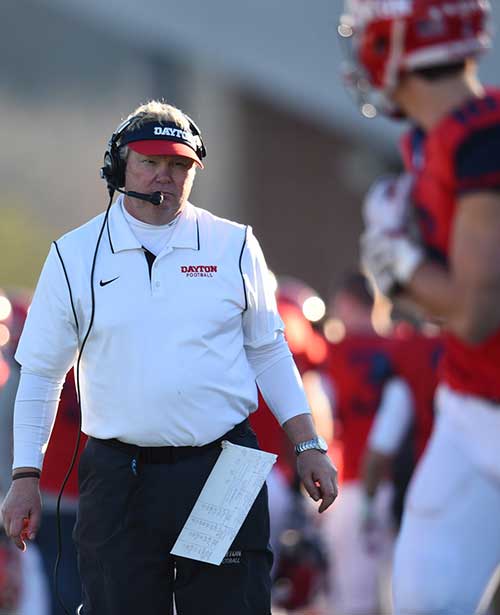Some UD seniors never want to leave. Rick Chamberlin stayed
In August 1975, a light green Mustang pulled into Dayton, driven by 18-year-old Rick Chamberlin '80. The car had a 302-cubic-inch engine, a four-barrel carburetor, mag wheels with Crager rims, air shocks and dual Thrush mufflers.
"It was loud and fast," he said.
During the next four years, Chamberlin, though himself a quiet person, attracted a lot of attention — not on the road, but on the football field. He was very good at hitting people. A linebacker, he became the first Dayton defensive player to be named an All American. He still holds Dayton Flyer records for career and season tackles.
Then he graduated.
"But I was the lucky one," he said. "Others get their degrees and leave. I got mine and stayed.”
“But I was the lucky one. Others get their degrees and leave. I got mine and stayed.”
By the time he retired after this past season, he had spent 48 years in the Dayton football program — as a player, assistant coach and head coach.
When Chamberlin’s head coaching career hit the 100-win mark, UD’s enterprising sports information director, Doug Hauschild ’81, searched the record books to see just how unusual this achievement was. NCAA Division I head football coaches with at least 100 wins number 429. Chamberlin is just the third who played for his alma mater, immediately joined the coaching staff and, without leaving, became head coach — all at one school.
The other two are William A. Alexander, who succeeded John Heisman at Georgia Tech, and Knute Rockne of Notre Dame.
Chamberlin after his UD career was about to become a high school assistant coach, but he got a call from Dayton about becoming a graduate assistant working with the football team. That job was followed by coaching linebackers then being the defensive coordinator then being head coach. He has spent three-fourths of his life with Dayton football.
It hasn’t been a seamless progression.
"Rick has been part of so many adjustments," said Mike Kelly, head football coach from 1981 through 2007, the longest head coaching tenure in UD history in any sport.
The first major adjustment came after Chamberlin’s sophomore year. The University had been playing Division I football but, like many schools, Kelly said, "was facing money issues. It offered fewer scholarships than many of its opponents, and Baujan (then the football stadium) was crumbling. Some schools, like Detroit and Xavier, were dropping football."
But the University’s president, Father Raymond A. Roesch, S.M. '36, and Tom Frericks '53, athletic director, did not want to abandon football. Chamberlin remembers going with the rest of the team to Boll Theatre to hear Frericks outline the plan to move UD football to Division III, the NCAA division that does not have athletic scholarships. Players in Chamberlin’s class could keep their scholarships. The next class, however, had to choose between keeping their scholarships but not play football or giving up their athletic scholarships.
It was a dramatic move. And one that ushered in an amazing era of Flyer football.

"The best thing about moving forward into Division III was UD hiring Rick Carter (head coach 1977-80) and Mike Kelly (head coach 1981-2007) to handle the transition," Chamberlin said. Kelly served as defensive coordinator under Carter before becoming head coach.
In Chamberlin’s senior season, the team reached the NCAA Division III playoffs for the first time. In the 1980 semifinals, with Chamberlin as an assistant, UD came back from being down by 24 to beat Widener 28-24. The Flyers then took the national championship with a 63-0 win over Ithaca. Dayton became so successful with Division III football that the NCAA in 1991 passed what was unofficially called the "Dayton Rule," which led to another period of adjustment in Chamberlin’s football life.
No longer could an institution field teams in more than one division. So UD could not have Division I basketball and Division III football. Dayton opted not to drop football but play it in Division I — without athletic scholarships. The University joined with other schools with that same philosophy to form the Pioneer Football League.
During his tenure as an assistant coach, Chamberlin, who grew up in Springfield, Ohio, had some opportunities to move on. "Carter asked me to follow him when he went to Holy Cross," Chamberlin said. "My wife and I were expecting our first child. It would be the first grandchild for each set of grandparents. I told him they’d kill us if we went to Massachusetts."
Besides other possibilities as a college assistant, there were options to be a high school head coach. "But I wanted to be a college head coach," Chamberlin said, "and there would be a time, after Mike retired, when I might be UD’s head coach."
“But I wanted to be a college head coach, and there would be a time, after Mike retired, when I might be UD’s head coach.”
That time came. Offensive coordinator Dave Whilding '85 (who had played quarterback for Carter at Earlham and joined him on the Dayton staff) said he didn’t plan on staying in coaching much longer. (He stayed four years as Chamberlin’s offensive coordinator.)
"Mike told the staff he was retiring," Chamberlin said. "He told me that Tim Wabler '74, the associate athletic director over football, and Ted Kissell, athletic director, wanted to talk with me. I met with the two of them. We talked for an hour and a half. Ted stood up, stuck out his hand and said, 'Congratulations, you’re our next football coach.'"
“Ted [Kissell] stood up, stuck out his hand and said, ‘Congratulations, you’re our next football coach.’”
Chamberlin’s first game was a victory over Central State at Welcome Stadium. A number of his Springfield North High School teammates attended as well as his retired high school coach Ormand Ricketts who had played for Woody Hayes at Ohio State. Ormand, Chamberlin said, "showed me the dedication and commitment it took to coach football."
During the post-game radio show a call came in. "This is Tyler from Utah. What was more exciting: your first college win or the birth of your first grandchild?"
"Both were exciting," Chamberlin replied, "but not as much as the birth of my second son, Tyler."
Chamberlin’s head-coaching career had many highlights. His 107 wins rank third among UD’s 23 head football coaches. Only Kelly and Harry Baujan have more; Chamberlin’s winning percentage is better than Baujan’s. One of the most dramatic victories came in 2010 over Drake; a last-minute, Hail Mary pass kept Dayton on track to being Pioneer Football League co-champions. In 2019, the Flyers beat Indiana State, which, with 63 full scholarships, was ranked 14 among Football Championship Subdivision.
Chamberlin won 80 PFL games; no other coach has won 60. His teams finished first or second eight times.
"Coach Chamberlin is literally defined by the teams he has put on the field over the last 14 years — smart, tough, loyal, high-integrity and winners,” said UD President Eric F. Spina at the Lackner Award ceremony.
"Rick’s values are fully aligned with UD’s values. Name me another football program around the country where a president can say that."
A quiet man

"I could hear him talking behind the partition: 'We’re going to do this. We’re going to do that. I’m going to drill him,'" Kelly said. "I wondered who he was talking to with so much animation. So I looked in.
"He was talking to himself."
Dayton beat the spread. By a lot. They lost by four but had led at halftime when they left the field to a standing ovation from the Iowa State fans.
The same controlled intensity carried into his coordinator days with Kelly. "At practice, for a stretch you wouldn’t hear a peep from him," Kelly said. "Then he’d raise his voice and 50 defensive players would turn and listen."